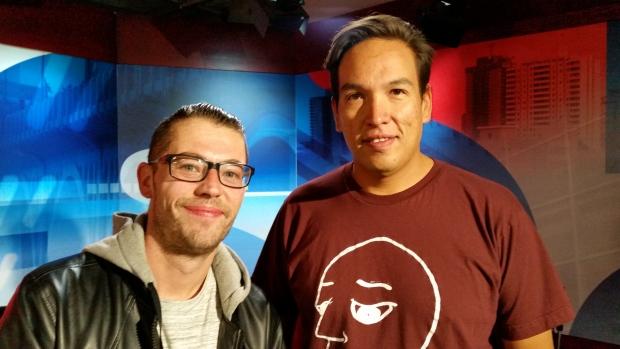 |
Canku Ota
|
 |
|
(Many Paths)
|
||
|
An Online Newsletter
Celebrating Native America
|
||
|
October 2017 - Volume
15 Number 10
|
||
|
|
||
|
Hip Hop Goes To School
In Saskatoon, Exploring Connections With Indigenous Culture
|
||
|
by Danny Kerslake, CBC
News
|
||
|
InfoRed and
Emotionz lead youth through interactive songwriting workshops
There is a lot to unpack when you open a conversation about the larger meaning of hip-hop culture with Brad Bellegarde and Dave Nelson, better known as InfoRed and Emotionz.
"I think that hip hop is a really unique way of connecting students to Indigenous culture," said Bellegarde in an interview with CBC Radio's Saskatoon Morning. 2 worlds collide Bellegarde and Nelson were in Saskatoon Wednesday at Caswell Hill School, offering workshops for students in grades 7 and 8 on hip hop and the way it intermingles with and represents Indigenous culture in a modern, urban context. "We are going to be doing some songwriting, beat boxing, kind of talking about the correlation of First Nations culture and hip hop, everything from the circle and the turntable to how graffiti and totem poles have similarities…. Powwow to breakdancing," said Nelson. "I like to start with having a rap," said Bellegarde. "You see their eyes open up they are really in tune." The workshops are interactive, urging students to try out word association with the goal of composing a hip-hop song, one that can be performed by the kids themselves. "Some kids jump up and start dancing; it's a really cool thing to see," said Bellegarde. This effort is part of the Canada 150 celebrations and so the lessons passed along in Saskatoon will also be broadcast out to other school across the country.
Hip hop as agent of reconciliation As ambitious as this all seems the two artists have even loftier goals, as they attempt to teach the teachers that hip-hop culture is not the stereotype they may see in popular culture. Bellegarde said it is not about cash, gangs and violence. "Hip hop was formed on the basis of creating a voice and an opportunity to speak about social issues that are happening in the community," he said. They said their lesson is also about reconciliation between Indigenous and non-Indigenous Canadians. There is equity in hip hop, they said, and the music crosses all ethnic boundaries. |
|||||
|
|
|
|
||
|
|
||
| Canku Ota is a free Newsletter celebrating Native America, its traditions and accomplishments . We do not provide subscriber or visitor names to anyone. Some articles presented in Canku Ota may contain copyright material. We have received appropriate permissions for republishing any articles. Material appearing here is distributed without profit or monetary gain to those who have expressed an interest. This is in accordance with Title 17 U.S.C. Section 107. | ||
|
Canku Ota is a copyright ©
2000 - 2017 of Vicki Williams Barry and Paul Barry.
|
||
 |
 |
|
|
The "Canku
Ota - A Newsletter Celebrating Native America" web site and
its design is the
|
||
|
Copyright ©
1999 - 2017 of Paul C. Barry.
|
||
|
All Rights Reserved.
|
||

